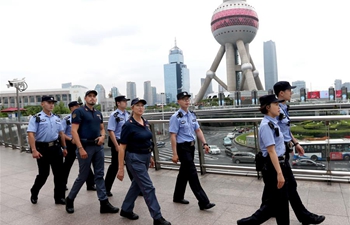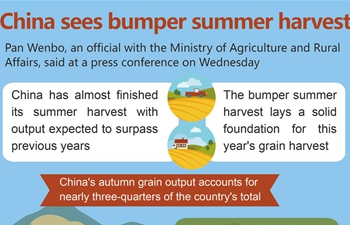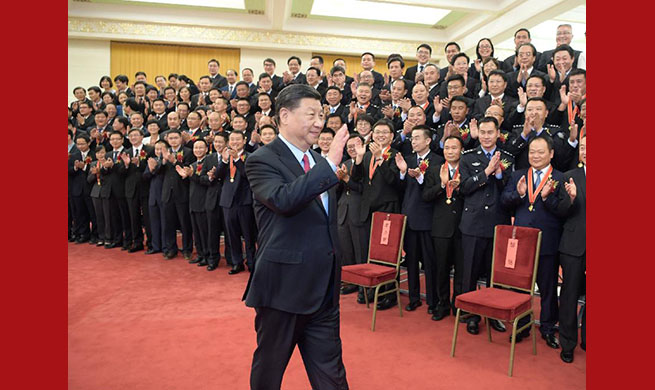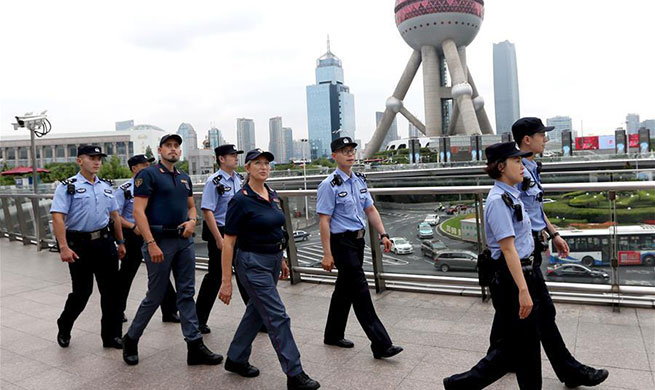by John S. Marshall, Gao Lu
HOUSTON, June 26 (Xinhua) -- As the trade frictions between China and the United States continue, there appears to be no immediate relief in sight for Texas farmers and other players in the state's economy that are being hurt by the tensions.
Texas, the second largest U.S. state both in size and population, is the third largest trading partner of China. The protracted tensions have a major impact on both the state and the U.S. economy.
FARMERS BEING VICTIMIZED
As a major agricultural producer, the Lone Star state has more farms and more land being farmed than any U.S. other state, according to the Department of Agriculture. With 133 million U.S. dollars in annual sales, Texas farmers account for 19 percent of the country's total sales in agri-tourism and recreation, the department said.
Texas has long been the leading cotton producer in the United States, accounting for nearly half of the cotton crop being exported to China in the recent past. It's also a leading sorghum grain producer, with about a quarter of the state's crop being shipped to China.
But it is becoming increasingly difficult to sell agricultural products from Texas and across the country to Chinese buyers because higher tariffs are making them more expensive.
What's more, net farm income across Texas has dropped more than half in the last six years, according to officials at the Texas Farm Bureau, a non-profit group that describes itself as the voice of Texas agriculture. Mother Nature and other factors can be blamed for a portion of the drop, but the intensifying trade war is accelerating the decline.
"The only way for agriculture to recover is with a healthy, robust, trade agreement, or trade practices," Gene Hall, communications director of the bureau, told Xinhua.
A 16-billion-dollar aid package by the Trump administration to help farmers being hurt by the trade war is expected to ease some of the financial pain, but, as Hall pointed out, the aid package will provide only temporary financial relief.
"Until we get trade fixed it's not likely to get much better," said Hall, emphasizing that U.S. farmers have been "victimized by mounting trade tensions."
ENERGY COMPANIES IN MORE DIFFICULT POSITION
As the United States flexes its muscles in world oil markets, Texas oil producers are keeping a wary eye on how the trade frictions could impact oil exports. The United States is now the world's leading oil and natural gas producer, with Texas leading all 50 states in both crude oil and natural gas production, according to the Energy Information Administration.
As the United States continues its expanding dominance in exporting energy to the rest of the world, most of the gains in production will come from the Permian Basin, an area of massive oil fields in west Texas, said the administration.
Todd Staples, president of the Texas Oil & Gas Association, told local media that the expanding trade war with China was a "major concern."
"When market share is lost, it is difficult to regain. A swift resolution is in the best interest of Texas, and the United States and China as well," he said.
Among U.S. energy products, liquefied natural gas (LNG) has been hard hit. Chinese imports of LNG have declined since last September when a 10-percent tariff was imposed by Beijing in response to trade frictions provoked by the United States. The tariff was raised to 25 percent this month.
Katherine Ehly, senior policy advisor at the Natural Gas Suppliers Association, told Xinhua that there were "32 cargo ships with LNG to China" in 2018 before U.S.-China trade tensions escalated. "This year, it's been three cargo ships."
There are currently three terminals in the United States that produce LNG for shipment to China, Ehly said. "Other terminals are under construction in Texas, Louisiana and Georgia," she added.
Those terminals are expected to come into use next year in the southern states, and increase export capacity to China considerably.
Experts have warned that the tariff hike would cause some multi-million-dollar LNG projects to be cancelled, putting U.S. companies in a more difficult situation.
SLOW MANUFACTURING GROWTH
Also growing increasingly concerned are Texas manufacturers. Growth is continuing across the industry, but the pace is slowing and uncertainty continues, according to an economist with the Federal Reserve Bank of Dallas.
"The latest Texas manufacturing report shows continued expansion but a downshift in the pace of growth in May," Emily Kerr, Dallas Fed senior business economist, said in a report in May.
"Firms' outlooks deteriorated, with the index turning slightly negative for the first time this year and uncertainty surrounding those outlooks spiking," said the report. "Several businesses pointed to tariffs, and specifically trade talks with China, as a contributing factor to the increased uncertainty."
As Texas is a major trading partner of China, hope remains that China-U.S. trade relations could be back on track.
"A farmer is nothing but hopeful," said the Farm Bureau's Hall. "We are hopeful, we're expecting a trade deal, (and) we need a trade deal."












